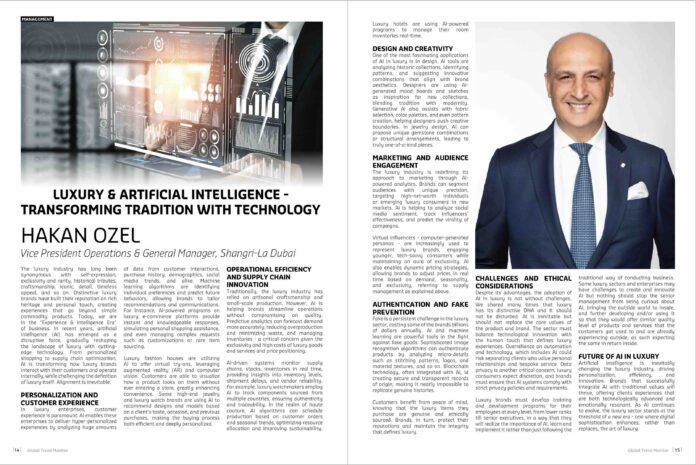Hakan Ozel, Vice President Operations & General Manager, Shangri-La Dubai
The luxury industry has long been synonymous with self-expression, exclusivity and rarity, historical tributes, craftsmanship, iconic, detail, timeless appeal, and so on. Distinctive luxury brands have built their reputation on rich heritage and personal touch, creating experiences that go beyond simple commodity products. Today, we are in the “Experience & Intelligence Era” of business. In recent years, artificial intelligence (AI) has emerged as a disruptive force, gradually reshaping the landscape of luxury with cutting-edge technology. From personalized shopping to supply chain optimization, AI is transforming how luxury brands interact with their customers and operate internally, while challenging the definition of luxury itself. Alignment is inevitable.
Personalization and Customer Experience
In luxury enterprises, customer experience is paramount. AI enables these enterprises to deliver hyper-personalized experiences by analyzing huge amounts of data from customer interactions, purchase history, demographics, social media trends, and alike. Machine learning algorithms are identifying individual preferences and predict future behaviors, allowing brands to tailor recommendations and communications. For instance, AI-powered programs on luxury e-commerce platforms provide instant and knowledgeable responses, simulating personal shopping assistance, and even managing complex requests such as customizations or rare item sourcing.
Luxury fashion houses are utilizing AI to offer virtual try-ons, leveraging augmented reality (AR) and computer vision. Customers are able to visualize how a product looks on them without ever entering a store, greatly enhancing convenience. Some high-end jewelry and luxury watch brands are using AI to recommend designs and models based on a client’s taste, occasion, and previous purchases, making the buying process both efficient and deeply personalized.
Operational Efficiency and Supply Chain Innovation
Traditionally, the luxury industry has relied on artisanal craftsmanship and small-scale production. However, AI is helping brands streamline operations without compromising on quality. Predictive analytics can forecast demand more accurately, reducing overproduction and minimizing waste, and managing inventories – a critical concern given the exclusivity and high costs of luxury goods and services and price positioning.
AI-driven systems monitor supply chains, stacks, inventories in real time, providing insights into inventory levels, shipment delays, and vendor reliability. For example, luxury watchmakers employ AI to track components sourced from multiple countries, ensuring authenticity and traceability. In the realm of haute couture, AI algorithms can schedule production based on customer orders and seasonal trends, optimizing resource allocation and improving sustainability. Luxury hotels are using AI-powered programs to manage their room inventories real-time.
Design and Creativity
One of the most fascinating applications of AI in luxury is in design. AI tools are analyzing historic collections, identifying patterns, and suggesting innovative combinations that align with brand aesthetics. Designers are using AI-generated mood boards and sketches as inspiration for new collections, blending tradition with modernity. Generative AI also assists with fabric selection, color palettes, and even pattern creation, helping designers push creative boundaries. In jewelry design, AI can propose unique gemstone combinations or structural arrangements, leading to truly one-of-a-kind pieces.
Marketing and Audience Engagement
The luxury industry is redefining its approach to marketing through AI-powered analytics. Brands can segment audiences with unique precision, targeting high-net-worth individuals or emerging luxury consumers in new markets. AI is helping to analyze social media sentiment, track influencers’ effectiveness, and predict the virality of campaigns.
Virtual influencers – computer-generated personas – are increasingly used to represent luxury brands, engaging younger, tech-savvy consumers while maintaining an aura of exclusivity. AI also enables dynamic pricing strategies, allowing brands to adjust prices in real time based on demand, seasonality, and exclusivity, referring to supply management as explained above.
Authentication and Fake Prevention
Fake is a persistent challenge in the luxury sector, costing some of the brands billions of dollars annually. AI and machine learning are powerful tools in the fight against fake goods. Sophisticated image recognition algorithms can authenticate products by analyzing micro-details such as stitching patterns, logos, and material textures, and so on. Blockchain technology, often integrated with AI, id creating secure and transparent records of origin, making it nearly impossible to replicate genuine histories.
Customers benefit from peace of mind, knowing that the luxury items they purchase are genuine and ethically sourced. Brands, in turn, protect their reputations and maintain the integrity that defines luxury.
Challenges and Ethical Considerations
Despite its advantages, the adoption of AI in luxury is not without challenges. We shared many times that luxury has its distinctive DNA and it should not be disturbed. AI is inevitable but should not replace the core values of the product and brand. The sector must balance technological innovation with the human touch that defines luxury experiences. Overreliance on automation and technology, which includes AI could risk separating clients who value personal relationships and bespoke service. Data privacy is another critical concern; luxury consumers expect discretion, and brands must ensure that AI systems comply with strict privacy policies and requirements.
Luxury brands must develop training and development programs for their employees at every level, from lower ranks till senior executives, in a way that they will realize the importance of AI, learn and implement it rather than just following the traditional way of conducting business. Some luxury sectors and enterprises may have challenges to create and innovate AI but nothing should stop the senior management from being curious about AI, bringing the outside world to inside, and further developing and/or using it so that they would offer similar quality level of products and services that the customers got used to and are already experiencing outside, as such expecting the same in return inside.
Future of AI in Luxury
Artificial intelligence is inevitably changing the luxury industry, driving personalization, efficiency, and innovation. Brands that successfully integrate AI with traditional values will thrive, offering clients experiences that are both technologically advanced and emotionally resonant. As AI continues to evolve, the luxury sector stands at the threshold of a new era – one where digital sophistication enhances, rather than replaces, the art of luxury.
